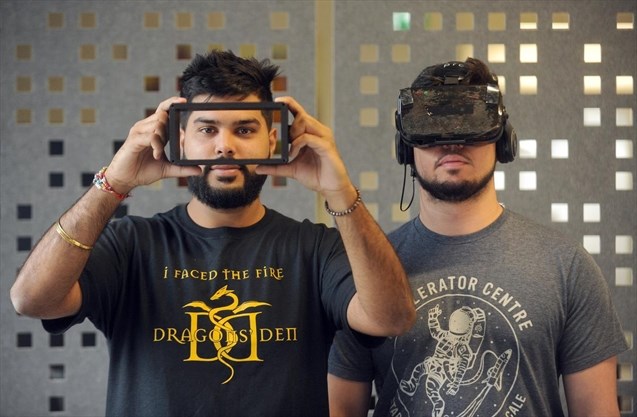
Guard-Ex and SannTek are betting on vastly different technologies to detect impairment
WATERLOO — A pair of local startups are developing hand-held devices police could use to quickly determine if a driver is high on marijuana, but neither will be ready when recreational use becomes legal Oct. 17.
The startups — Guard-Ex and SannTek — are betting on vastly different technologies
The two are among a number of startups across North America working on hand-held detectors for weed. So far, there is no clear leader in the detection field, which has a worldwide market estimated at $6 billion.
Guard-Ex, which is in the Waterloo Accelerator Centre’s JumpStart program and the Laurier Launchpad incubator, uses a virtual reality headset to measure eye movements, muscle activity, brain waves, body temperature and heart rate. SannTek, which is based in the Velocity Garage in downtown Kitchener, uses nanotechnology to analyze breath samples.
Harmeet Chauhan, chief financial officer at Guard-Ex, holds a VR headset in one hand and points to the technology the startup put inside to detect when someone is high on marijuana and a long list of other drugs, including cocaine and opiates.
“It is all scientifically proven. We are just automating the way we collect the data,” said Chauhan.
When a police officer suspects a driver might be stoned, the Guard-Ex device is strapped over the driver’s face. The officer sees the driver’s eye movements and other biological indications of impairment on the laptop screen in the cruiser. It takes about one minute to gather the information, said Chauhan.
Additionally, there are two lights — one red, the other green — on the front of the headset. When the red one is on, the driver is free to go. If the green one lights up, the officer brings the driver to the station for more testing.
“We have two prototypes right now,” said Chauhan.
Guard-Ex’s device will undergo testing at the Laurier Centre for Cognitive Neuroscience to validate the technology. After that, the startup will try to get advanced prototypes into police cruisers for field testing. It wants the device ready in July 2019 with a price tag of about $2,500 per unit, plus a small monthly fee.
“We will be conducting a pilot program from January to April,” said Chauhan. “We have a few different police forces we are working with.”
Guard-Ex will appear on the Oct. 18 episode of the CBC Television program “Dragons’ Den,” one day after recreational marijuana use becomes legal across Canada.
Meanwhile, SannTek is using supersensitive nanotechnology that can detect a minuscule amount of THC — the main psychoactive ingredient in marijuana — in a breathe sample.
“Product development is going well,” said Noah Debrincat, co-founder of SannTek. “We are actively working on a prototype.”
By year’s end, Debrincat aims to have an advanced prototype. A few months ago, the federal government approved the use of a device that analyzes the fluids collected on a swab, but that is accurate only 65 per cent of the time, said Debrincat.
In July, the federal government approved a roadside testing device called the Draeger DrugTest 5000. But so far no police force in Canada has adopted it over concerns about accuracy, although a few are testing it. Officers must swab the inside of a driver’s mouth to collect saliva for testing.
Debrincat believes a breathalyzer-style device will emerge as the superior technology for detecting when drivers are high on marijuana. Marijuana can be found in human breath for two to four hours after it was smoked, which is also when a marijuana user is most impaired, said Debrincat.
“So the shift is definitely moving toward technology like a breathalyzer to home in on that window of impairment,” he said.
SannTek expects to launch its product sometime next year. Penalties for impaired driving are severe so the startup does not want to rush its device to market. The technology used to address impaired driving must be beyond criticism, said Debrincat.
“I am not in the business of giving the police something that isn’t working absolutely perfectly,” he said.
SannTek said it is the only startup to use nanotechnology in its device, which makes it more sensitive than other roadside testers. The SannTek device will detect a picogram — or one trillionth of a gram — of THC in a breath sample, said Debrincat.
If a driver fails a roadside test, the police have grounds to detain the individual for further testing at a police station to determine if the blood concentration of THC exceeds the legal limit of four nanograms.


